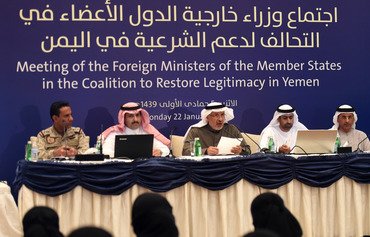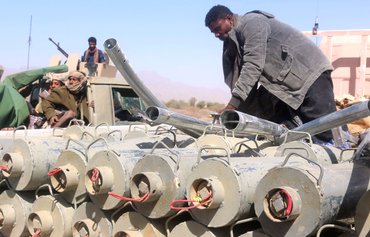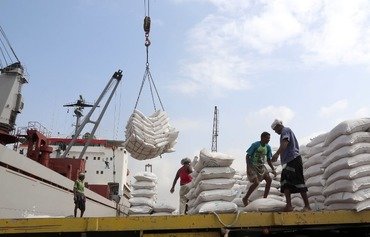Arab coalition countries have been providing direct humanitarian assistance to the Yemeni people in areas liberated from the Iran-backed Houthis (Ansarallah), Yemeni officials told Al-Mashareq.
The Arab coalition in January launched the Yemen Comprehensive Humanitarian Operation, which aims to address the immediate and long-term humanitarian situation in Yemen by providing and distributing relief to the Yemeni people.
Saudi Arabia, the UAE and other coalition member states have provided $1.5 billion in support of the plan, which will see the establishment of 17 land crossings and an air bridge, campaign officials said.
Shipments delivered by air, land and sea will include food, medicine and other goods to assist aid organisations on the ground, the coalition said at the launch.
Facilitating entry, delivery of aid
In December, the Arab coalition co-ordinated the opening of al-Ghayza airport in Yemen's al-Mahra province with the Yemeni government, al-Arabiya reported.
The airport has been receiving planes carrying relief and humanitarian aid, with the first Saudi Royal Air Force aircraft to arrive carrying 5,000 food baskets provided by the King Salman Humanitarian Aid and Relief Centre (KSRelief).
The Saudi Fund for Development on February 5th signed an agreement with the Yemeni Ministry of Public Works to finance the installation of four cranes at three main Yemeni ports, Asharq al-Awsat newspaper reported.
This seeks to facilitate imports and the entry of humanitarian aid, within the framework of the new comprehensive humanitarian plan, Saudi ambassador to Yemen Mohammed al-Jaber said when the agreement was announced.
"The coalition will continue to open corridors and facilitate the delivery of aid to all safe ports and crossings to the Yemeni interior and to co-ordinate with UN organisations," Arab coalition spokesman Col. Turki al-Maliki said at the time.
Aid from Saudi, Emirati organisations
Arab coalition countries, Saudi Arabia and the UAE in particular, have been providing aid to much of the country via KSRelief and the UAE Red Crescent, said Yemeni Minister of Local Administration Abdul-Raqib Fateh.
Fateh told Al-Mashareq he had met with officials from both organisations to expedite the delivery of emergency relief to districts liberated from the Houthis and al-Qaeda in al-Bayda, Shabwa and al-Hodeida provinces.
During these meetings, he said, he stressed the importance of transitioning from the provision of relief to funding reconstruction in these areas.
"Arab coalition forces provided relief aid as well as assistance to restore and operate generators in the districts liberated from al-Qaeda, and the districts of Usailan and Baihan, which were liberated from the Houthi militias," said Shabwa province official Mohammed Saleh bin Adyou.
This consists of monthly relief, in the form of food baskets and other aid, he added, also stressing the eventual need to move from providing aid to offering assistance with developmental projects.
Help is needed to restore electricity, water and healthcare projects, he said, and to reconstruct bridges and other vital facilities destroyed by the war.
Iran supplies 'nothing but weapons'
Saudi Arabia has been engaged in ongoing humanitarian efforts to help the Yemeni people, said Yemeni Minister of Public Works Moeen Abdul Malik, noting that Iran, meanwhile, has supplied nothing but weapons.
Yemen has no commercial relations with Iran, and the latter does not have an expatriate community in Yemen, Abdul Malik noted.
Iran interacts with Yemen only through the Houthis, he said, in the same way it does with Hizbullah in Lebanon and with militias it backs in other countries.
"We hope that Iran's hostile policy, which has totally undermined the stability of the Middle East, will change," he said.
Aid worker Fakhria Ali said she has learned through her work -- in al-Mokha after its liberation and al-Khokha before its liberation -- that aid reaches those in need "better in the areas controlled by the legitimate government".
In the areas under the control of the Houthis, the militia controls the aid, the way it is distributed and the beneficiaries, she told Al-Mashareq, which means it can be directed to those who do not need it.

![A Yemeni man carries a sack of food aid in the northern district of Abs in Yemen's Hajjah province, on February 18th. [Stringer/AFP]](/cnmi_am/images/2018/03/02/11650-Yemen-Hajjah-aid-600_384.jpg)






